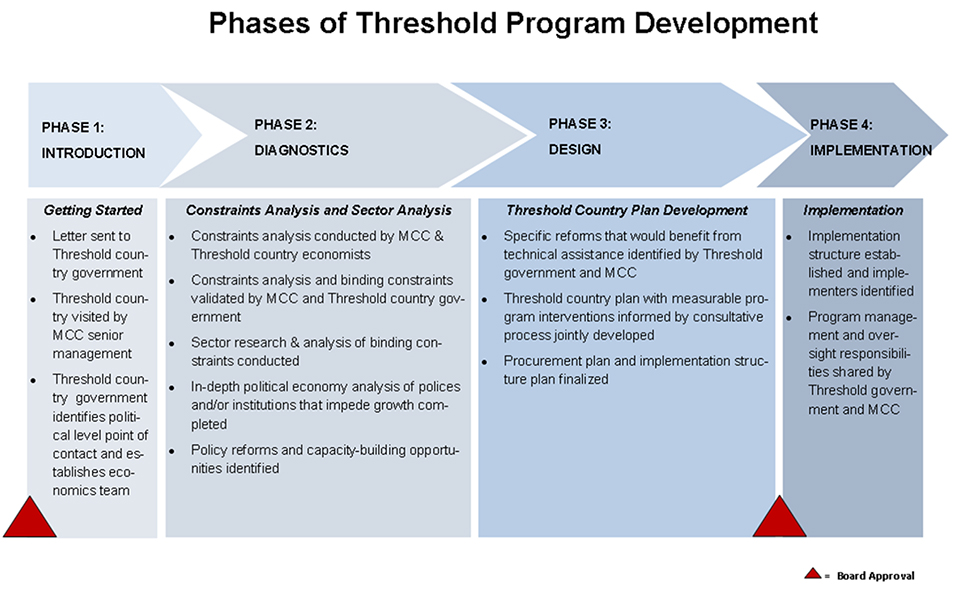| (in $ millions) | FY 2013 Pre-Sequester/ Rescission | FY 2013 Post-Sequester/ Rescission | FY 2014 Enacted | FY 2015 Request |
|---|---|---|---|---|
| Total Appropriation | 898.2 | 852.7 | 898.2 | 1,000.0 |
| Threshold Program | 15.0 | 14.3 | 20.0 | 30.0 |
The new Threshold Program entails a structured and disciplined diagnostic and design process. MCC begins with a rigorous analysis of the constraints to economic growth and the policies and institutions that reinforce those constraints to growth. MCC threshold program assistance supports government efforts at reform in these areas, which have the potential for the greatest impact on growth.For FY 2015, MCC plans to use $30.0 million to support the planned Nepal Threshold Program and threshold programs in up to two new countries to be selected by the Board in December 2014.
Background
MCC’s first generation Threshold Program invested roughly $500 million in 23 programs in 21 countries around the world. Twenty-one of these programs have been completed. Active programs in Niger and Timor-Leste are winding down, and the redesigned approach is currently being applied in three countries – Honduras, Nepal and Guatemala.MCC’s Threshold Program has been redesigned to assist countries to become compact eligible by challenging them to implement key policy and institutional reforms. If successfully implemented, these reforms will reduce constraints to faster economic growth and will provide MCC critical information about the country’s political will and capacity to undertake the types of reforms and investments that would have the greatest impact in compacts.
Not all countries with threshold programs will be selected for compact eligibility; but for those that are, successful implementation of their threshold program will yield significant advantages for a potential future compact. For example, the partner country will likely have enhanced its ability to design and implement those investments that will generate the greatest results, and MCC will also have a head start on the work and relationship necessary to design a high-impact compact. In some cases, MCC may also be able to make early progress in longer duration reforms that ultimately enhance compact success, if the country becomes compact eligible.
The prospect of a compact will create incentives for countries to implement the targeted reforms of a threshold program effectively and expeditiously, and provide MCC with important information about the country’s commitment to reform.
Threshold Program Updates
Honduras: MCC’s Board selected Honduras as eligible for threshold program assistance in FY 2012, and approved a $15.6 million threshold program in March 2013. The threshold program in Honduras will provide support to the government to undertake reforms to help improve government effectiveness over three years in two areas: public financial management and the efficiency and transparency of public-private partnerships. The public financial management component will address key weaknesses in planning, budgeting, procurement, payment, and audit. The public-private partnerships component will improve the government’s weak capacity for both the development of partnerships and the oversight of concessions once they are awarded.Nepal: MCC’s Board selected Nepal as eligible for threshold program assistance in FY 2012. A threshold program in Nepal will address underlying binding constraints to economic growth in a country that continues to make slow but steady progress in further institutionalizing democratic governance and reforming its economic governance. The constraints analysis identified four binding constraints to economic growth in Nepal: (1) policy implementation uncertainty exacerbated by the protracted political transition; (2) the inadequate supply of electricity; (3) the high cost of freight transport; and (4) outdated labor laws and challenging industrial relations. An MCC-led team is working with the Government of Nepal to develop options to provide technical assistance to support reforms in the power or transport sectors.
Guatemala: MCC’s Board selected Guatemala as eligible for threshold program assistance in FY 2013. A threshold program in Guatemala will address underlying binding constraints to economic growth and reduce historical inequalities that led to high poverty in a country that has recently shown progress, but needs further effort, in improving the rule of law and human capital. A joint team of MCC and Government of Guatemala economists is finalizing an analysis of the constraints to growth that will inform the development of the government’s reform efforts.


